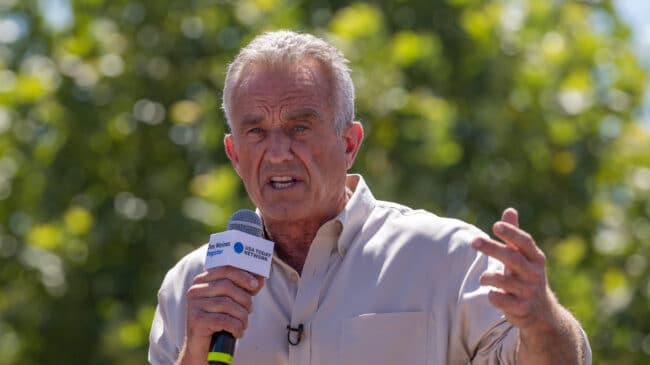Federal and state lawmakers have recently been taking steps to authorize limited access to psychedelics, given the abundant and growing research on their potential in tackling major mental health conditions like post-traumatic stress disorder (PTSD), addiction, treatment-resistant depression, and more.
The incoming Trump administration has promised sweeping reforms to federal health agencies, and Robert F. Kennedy, Jr.—nominated to lead the Department of Health and Human Services (HHS)—has indicated that reversing the federal suppression of psychedelics is a priority.
Several executive orders could help make psychedelic therapies available to veterans, first responders, trauma survivors, and other Americans who may benefit.
Executive Order recommendation: Reform scheduling criteria
Many psychedelic compounds were originally classified as Schedule I without a comprehensive and public evaluation of their risks to public health. Rescheduling to Schedules III, IV, or V would still allow FDA oversight and give direction to medical professionals for standards of treatment.
- An executive order could require the FDA and DEA to review their criteria for placing select drug compounds on Schedule I of the Controlled Substances Act and develop objective and universal criteria for comparable drugs on Schedule III or below. Currently, Controlled Substances Act (CSA) section 21 U.S.C. § 811 specifies that the attorney general shall consider eight factors, such as the potential for abuse when making a scheduling decision. By statute, power rests with agencies, and an executive order cannot compel an agency to contradict a law passed by Congress.
- This law gives the attorney general and health agencies authority to list substances regulated at different levels of risk and restrict doctors’ use of them in treatment.
- HHS is responsible for evaluating a drug’s medical potential and transmitting that information to the Drug Enforcement Administration (DEA) along with a scheduling recommendation. Importantly, the DEA is not bound by an HHS scheduling recommendation unless the HHS recommends that the substance not be subject to any control.
- As the DEA is a law enforcement agency within the Justice Department, it may not be the most appropriate agency to make these fundamental medical decisions.
Executive Order recommendation: Research
To advance our understanding of near-term potential governmental cost savings related to psychedelic-assisted therapies, the White House could:
- Conduct a cost-benefit analysis and determine whether the Department of Veterans Affairs and the Center for Medicare and Medicaid should cover psychedelics therapy as a potentially less expensive course of treatment for some conditions. It could also recommend covering more cost-efficient protocols, such as group psychedelic therapy.
- Direct the National Institutes of Health to evaluate the effectiveness of psychedelics like Ibogaine for treating opioid addiction in comparison to currently available treatments. This evaluation could support a consortium of states considering using opioid settlement funds for the advancement of ibogaine as addiction treatment.
Executive Order recommendations: Clinical trial reforms
The White House could issue a series of executive orders that direct the next head of the Food and Drug Administration (FDA) to review current clinical trial standards and consider:
- The high costs of drug approval instead create an incentive for drug makers to only pursue the development of synthetic substances.
- Removing the requirement for a placebo arm of a clinical trial.
- Last August, the FDA rejected an application for MDMA for the treatment of PTSD and requested another Phase III trial, in part because the FDA was concerned that participants were not truly “blind” to the treatment.
- Unfortunately, there is no well-established method of blinding participants from knowing whether they have taken hallucinogens. Allowing observational (real-world evidence) data as support in drug trials.
- Through the 21st Century Cures Act, Congress mandated that the FDA use observational (so-called “real world”) evidence in drug approval decisions. For instance, if data shows that the legalization of psilocybin in a state does not increase hospitalizations, the FDA could consider this evidence that the drug’s benefits outweigh its risks to public safety.
- Issuing an executive order requiring the new head of the FDA to review the August 2024 decision to send MDMA back to additional Phase III clinical trials based on new clinical trial standards that do not require a placebo control or that use observational data as evidence of safety. Allow Phases II and III to be conducted “post-market,” where patients can freely buy into an ongoing trial, knowing that they are accepting the higher risk of a provisionally approved drug in order to access promising new drugs that could improve or prolong their lives.
- Require the FDA to fast-track non-novel “legacy” psychedelic substances (e.g., psilocybin, MDMA) for drug approval based on observational data and permit their sale as generic pharmaceuticals.
- Many classic psychedelics, including psilocybin, MDMA, and LSD, cannot be patented because they are no longer considered “novel,” a key criterion for patentability. The lack of patentability means the commercial benefit of pursuing FDA approval for a new drug is limited, creating a perverse incentive that dissuades drug sponsors from developing natural and potentially highly effective drugs.
Full Backgrounder: Psychedelic Drug Policy Recommendations for the Incoming Trump Administration


